Joey Donnelly
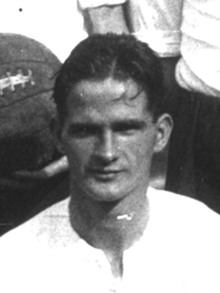
| Joey Donnelly | ||
|---|---|---|
| Apps | Goals | |
| League | 238 | 69 |
| FAI Cup | 52 | 14 |
| Shield | 129 | 35 |
| City Cup | 44 | 8 |
| Leinster Cup | 37 | 11 |
| Others | 19 | 5 |
| Totals | 519 | 142 |
| 1929-30 | 2 | 1 |
| 1930-31 | 41 | 12 |
| 1931-32 | 37 | 20 |
| 1934-35 | 41 | 11 |
| 1935-36 | 33 | 10 |
| 1936-37 | 37 | 14 |
| 1937-38 | 41 | 24 |
| 1938-39 | 41 | 16 |
| 1939-40 | 36 | 15 |
| 1940-41 | 37 | 10 |
| 1941-42 | 39 | 1 |
| 1942-43 | 37 | 5 |
| 1943-44 | 28 | 0 |
| 1944-45 | 30 | 2 |
| 1945-46 | 14 | 1 |
| 1946-47 | 25 | 0 |
| Totals | 519 | 142 |
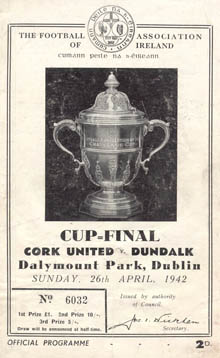
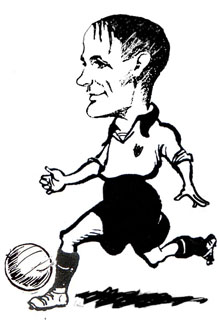
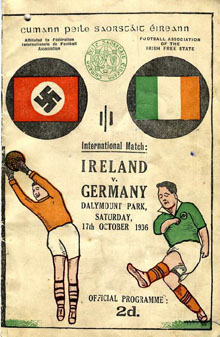
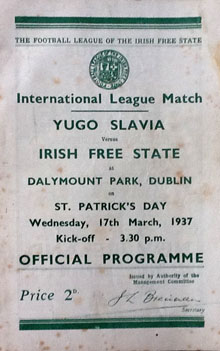
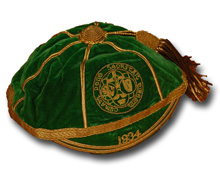
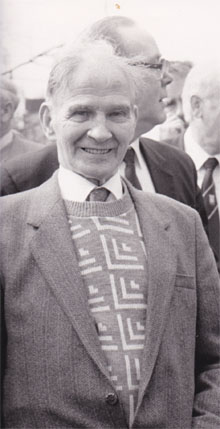
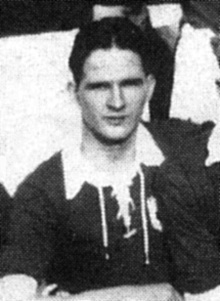
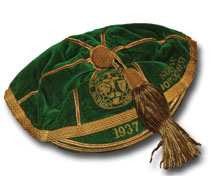
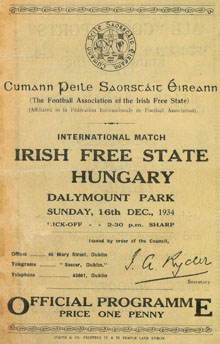
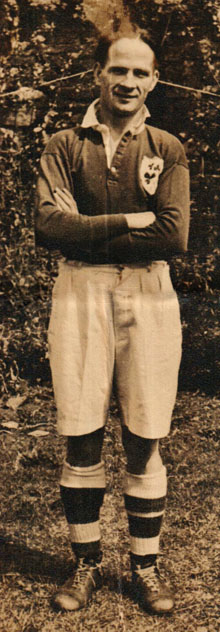
| Date Of Birth: | Oct 1 1909 |
| Place Of Birth: | Dundalk |
| Date Of Death: | Feb 29 1992 |
| Place Of Death: | Dundalk |
| Total Appearances: | 519 |
| Total Goals: | 142 |
| Position: | IF/RH |
| Nationality: | IRE |
| Debut: | 8-Sep-29, League, (h) Shelbourne 2-4 |
Bio:
The greatest footballer ever to come from Dundalk? Certainly he was the most decorated and celebrated. Captain of Dundalk’s first FAI Cup-winning team in 1942, he was honoured with 10 Irish International caps and the year before he died was inducted into the FAI Hall of Fame.
With his brothers Arthur and Charlie (a future Junior Internationalist), Joey’s early football was with Norton Villa in the local Minor League and Junior League, and later with St Malachys.
At the end of the 1928-29 season he travelled to Belfast with Dundalk’s first team for a friendly against Linfield and during the following year got a couple of games in the Free State League. Under trainer and virtual manager Steve Wright he made the left wing spot his own during the next two seasons, missing only a handful of games.
With Gerry McCourt as his inside partner, there were two runner-up finishes in 1930-31, each to Shamrock Rovers in the League and Free State (later the FAI) Cup. Joey’s first winner’s memento came in 1931-32 when the club landed its first trophy, defeating Shamrock Rovers 7-3 in the final of the Presidents Cup.
He closed that season when Dundalk defeated Glasgow Celtic in an end-season friendly at the Athletic grounds, Joey scoring the winner in a 2-1 victory.
Meanwhile he had received on offer from Belfast Celtic that according to himself he could not refuse, £30 signing-on fee, £3-50sh. per week and travelling to Belfast on match day with expenses of £1 per week (the train fare was 5 shillings return). He made his Celtic debut in a City Cup fixture at the Newry Showgrounds on May 7 1932, with the visitors winning 4-0.
Slightly-built and only 5’ 7’’, he was difficult to dispossess and his skilful ball play fitted in perfectly with the Celtic tradition. In an all-International forward line of Johnny Brown, Keiler McCullough, Dave ‘Boy’ Martin, Donnelly and Jackie Coulter, the League Championship, City Cup and Gold Cup ended up at Celtic Park in Joey’s first season of 1932-33. The County Antrim Shield final went to a third replay before Linfield prevailed.
The oldest player in the line at 22 years of age, he was moved inside to accommodate Coulter on the left wing and his 10 League goals that included a hat-trick against Portadown and was boosted as the team’s penalty taker, saw him second leading scorer to Dave ‘Boy’ Martin.
A change in the travelling arrangements for the next season—requiring him to travel to Belfast on Tuesday and remain there until after Saturday’s match—did not suit Joey and he returned to Dundalk for the 1934-35 season.
His first of ten Irish caps came a few months after his return and he celebrated with a brilliant goal, from a Willie Fallon cross, in a 4-2 loss to Hungary at Dalymount Park in December 1934. In his ‘Book of Irish Goalscorers’ Sean Ryan described Joey’s international career as follows;
“Two games stand out, both at Dalymount Park. In March 1936 he celebrated St Patrick’s Day with a win over Switzerland and played a crucial role in that success. The Irish Independent reported: ’Donnelly acted as a link between the halves and the forwards. Playing well behind his front-line colleague, he secured many Swiss clearances and in this way kept up or developed numerous home attacks’. Seven months later he played one of his greatest games when, with Paddy Moore, he took the German defence apart to inspire Ireland to a tremendous 5-2 winâ€.
His displays attracted cross-channel attention but possible moves to Walsall and later Oldham Athletic were thwarted by the fee demands of Belfast Celtic, who according to FA rules still held his registration.
During a three-match European tour in May 1936 that included International games against Hungary and Luxembourg he was presented with the Man of the Match award at Cologne following a 4-1 defeat by a Rhineland XI. There was a distinct Dundalk flavour to this tour—Billy O’Neill also played in all the matches, Jerry McCourt was team trainer and Dundalk secretary Bob Prole, vice-Chairman of the Free State League was a member of the Irish travelling party.
Joey’s successes with Dundalk were strictly limited. Apart from his 1932 Presidents Cup and a City Cup triumph in 1937, he had ten runners up awards that included three League Championships and three FAI Cups, in 1931, 1935 (losing 4-3 to Bohemians) and a 1938 loss to St James’s Gate.
His importance to the club was typified in the successful 1937-38 City Cup campaign when he scored in all three rounds, and including the extra-time penalty winner in the final against Cork.
But all the heartaches were swept away by the historic 1942 FAI Cup victory when Joey, now in his favourite right-half back position, as captain he brought the trophy back to Dundalk to a rapturous reception after defeating Cork City in the Dalymount final.
A week later Joey’s benefit was held at the Athletic Grounds against Shamrock Rovers and a month later a memorable year was concluded with the winning of the Inter City Cup, defeating Belfast Celtic in a titanic semi-final and Shamrock Rovers in the final.
From the right-half position his role had become more influential and his partnership with Paddy Barlowe on the right wing and Jimmy McArdle at inside-right were critical to the year’s successes.
He retired at the end of the 1946-47 season and in his last season his prompting of Peter Corr was instrumental in Peter’s transfer to Everton. With Bank Rovers in the local Junior Leagues he finished his local playing career but until the early 50s, when he was in his forties, he was one of the stars of the South Armagh Summer League where he captained the Darkley team to success in a number of money-prized tournaments that regularly drew crowds in excess of 1,000.
There was one last hurrah when he joined up with his old comrade Jerry McCourt in September 1963, thirty three years after they had first played together, managing Dundalk to become the first League of Ireland team to win away from home in European competition, when they defeated Zurich by 2-1.
In April 1991, 9 months before he died, he received his last football honour when he was inducted into the inaugural League of Ireland Hall of Fame in the company of Joe O’Reilly (St James’s Gate) and Paddy Coad (Shamrock Rovers).
What They Said About Him
His last representative appearance came in 1938 when he was on the League of Ireland team defeated 3-1 the Irish League, when his performance drew the following rapturous assessment from the Irish News; ‘His ball control and his happy knack of filling the inside left, left-half and sometimes the inside-right berth, reminded me of Bryn Jones, Wolves International. I haven’t seen a better inside-forward display in years’.
Honours:
5 Wins: FAI and Inter City Cups 1941-42; 2 City Cups 1937-38 and 1942-43; Presidents cup 1931-32.
14 Runners Up: 3 League 1930-31, 1936-37, 1942-43; 3 FAI Cup 1930-31, 1934-35, 1937-38; 2 Shield 1941-42, 1946-47; 1 City Cup 1940-41; 4 Leinster Cup 1934-35, 1935-36, 1936-37, 1938-39; 1 Presidents Cup 1943-44.
10 Ireland caps (scored 4 goals)
Won 3; Drew 1; Lost 6.
First FR Hungary (h) 2-4 Dec-34
Last WC Norway (a) 2-3 Oct-37
2 League of Ireland caps
League of Ireland Hall of Fame 1991
Club Scoring Records:
Most Goals 142; Most League Goals 69; Most FAI Goals 14
Leading Scorer:
1936-37, 1937-38
With Belfast Celtic
2 seasons 1932/33 and 1933/34
Appearances 78 [Goals 25] of which League 47 [16]; City Cup 17 [7]; Irish Cup 5 [1]; Others 9 [1].
Competition Honours: 2 Wins League and City Cup 1932/33; 3 Runner Up League and City Cup 1933/34; County Antrim Shield 1932/33.